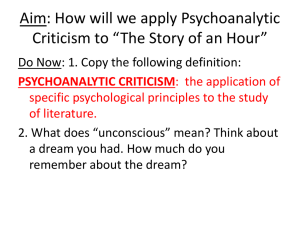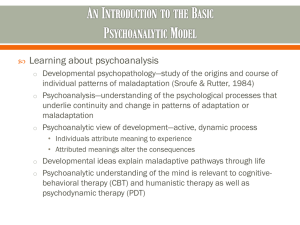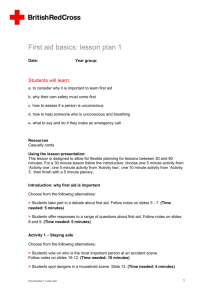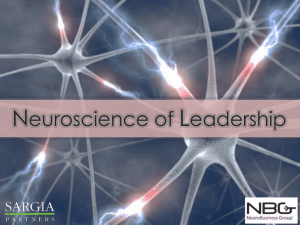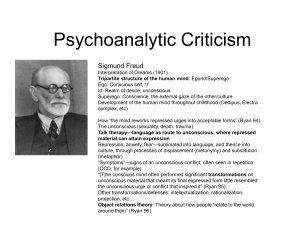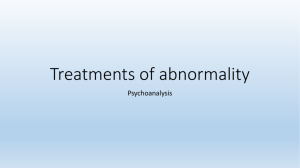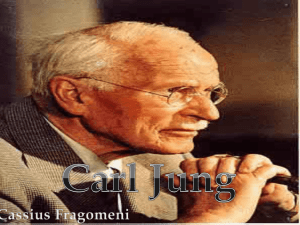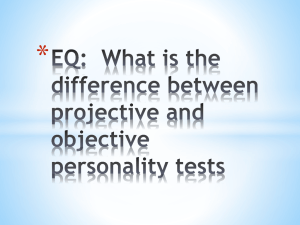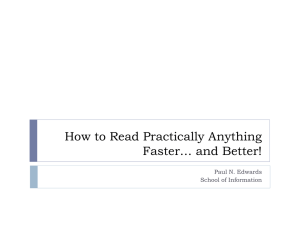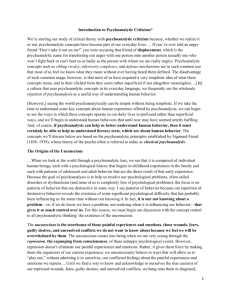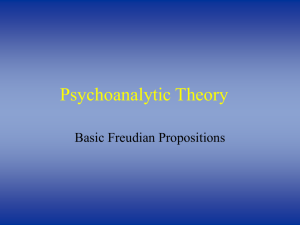BARRIERS TO SUCCESS: INTERNAL WORLD and
advertisement
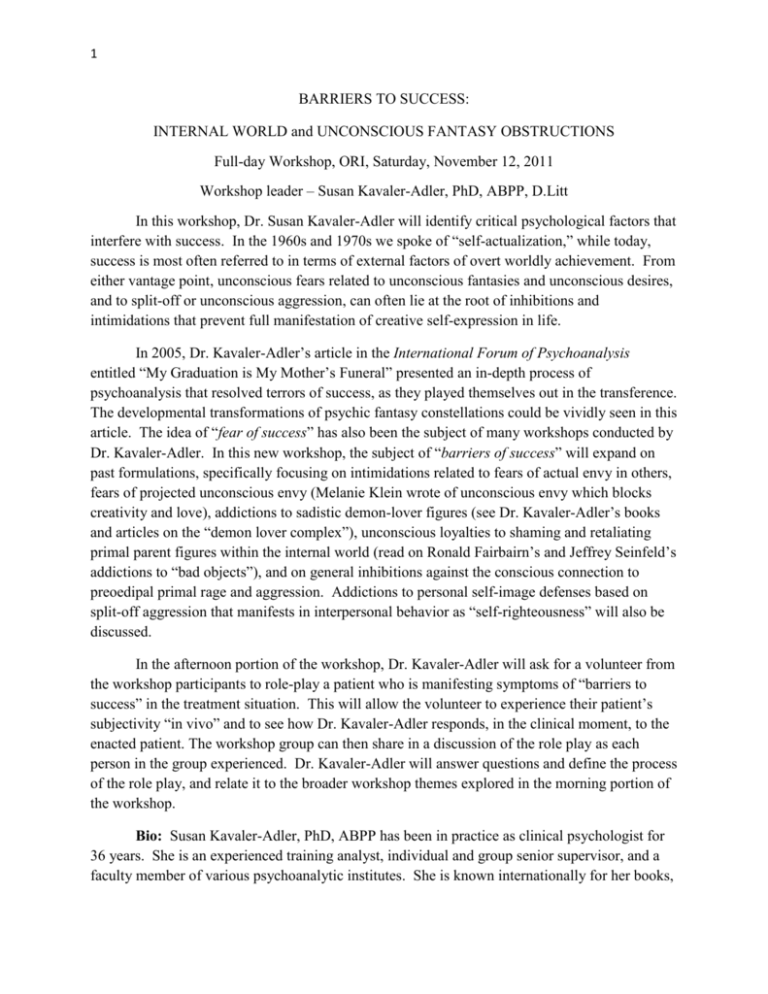
1 BARRIERS TO SUCCESS: INTERNAL WORLD and UNCONSCIOUS FANTASY OBSTRUCTIONS Full-day Workshop, ORI, Saturday, November 12, 2011 Workshop leader – Susan Kavaler-Adler, PhD, ABPP, D.Litt In this workshop, Dr. Susan Kavaler-Adler will identify critical psychological factors that interfere with success. In the 1960s and 1970s we spoke of “self-actualization,” while today, success is most often referred to in terms of external factors of overt worldly achievement. From either vantage point, unconscious fears related to unconscious fantasies and unconscious desires, and to split-off or unconscious aggression, can often lie at the root of inhibitions and intimidations that prevent full manifestation of creative self-expression in life. In 2005, Dr. Kavaler-Adler’s article in the International Forum of Psychoanalysis entitled “My Graduation is My Mother’s Funeral” presented an in-depth process of psychoanalysis that resolved terrors of success, as they played themselves out in the transference. The developmental transformations of psychic fantasy constellations could be vividly seen in this article. The idea of “fear of success” has also been the subject of many workshops conducted by Dr. Kavaler-Adler. In this new workshop, the subject of “barriers of success” will expand on past formulations, specifically focusing on intimidations related to fears of actual envy in others, fears of projected unconscious envy (Melanie Klein wrote of unconscious envy which blocks creativity and love), addictions to sadistic demon-lover figures (see Dr. Kavaler-Adler’s books and articles on the “demon lover complex”), unconscious loyalties to shaming and retaliating primal parent figures within the internal world (read on Ronald Fairbairn’s and Jeffrey Seinfeld’s addictions to “bad objects”), and on general inhibitions against the conscious connection to preoedipal primal rage and aggression. Addictions to personal self-image defenses based on split-off aggression that manifests in interpersonal behavior as “self-righteousness” will also be discussed. In the afternoon portion of the workshop, Dr. Kavaler-Adler will ask for a volunteer from the workshop participants to role-play a patient who is manifesting symptoms of “barriers to success” in the treatment situation. This will allow the volunteer to experience their patient’s subjectivity “in vivo” and to see how Dr. Kavaler-Adler responds, in the clinical moment, to the enacted patient. The workshop group can then share in a discussion of the role play as each person in the group experienced. Dr. Kavaler-Adler will answer questions and define the process of the role play, and relate it to the broader workshop themes explored in the morning portion of the workshop. Bio: Susan Kavaler-Adler, PhD, ABPP has been in practice as clinical psychologist for 36 years. She is an experienced training analyst, individual and group senior supervisor, and a faculty member of various psychoanalytic institutes. She is known internationally for her books, 2 articles, and teachings on object relations theory within the practice of psychoanalysis and psychoanalytic psychotherapy. Although formerly teaching actively at the National Institute for the Psychotherapies (NIP), and Postgraduate Center for Mental Health, she founded the Object Relations Institute for Psychotherapy and Psychoanalysis in 1991 (with the help of Dr. Robert Weinstein who initiated the experiential group supervision program), after she designed a unique curriculum that integrates the critical clinical and developmental theory contributions of the British and American object relations theorists. Dr. Kavaler-Adler has served as the Executive Director of the Object Relations Institute for 20 years, and teaches actively at the institute, along with doing training analysis and supervision, and conducting workshops and conferences. Dr. Kavaler-Adler is the author of three internationally read books, and 60 journal articles and edited book chapters. She won an Honorary Doctorate in Literature in 2008, and 11 psychoanalytic awards for her writing over the years, which covers her writing on women artists and writers, on the “developmental mourning process,” on the creative process, on the “demon lover complex,” and on object relations theory related to issues of self-integration and separation-individuation. Dr. Kavaler-Adler shows that process of self-integration is dependent on the success of “developmental mourning” process (versus developmental arrest in the form of an object relations pathological mourning state, which manifests as a bad object addiction that is eroticized into the form of a “demon lover complex”). One of Dr. Kavaler-Adler’s awards was the National Gradiva Award (from NAAP), won for her third Routledge book, Mourning, Spirituality and Psychic Change: A New Object Relations View of Psychoanalysis. She is known in America, England, and South Korea for her particular writings on erotic transference, and on the development of the creative and spiritual selves along with the full evolution of erotic desire and primary love. She is also noted for her writings on envy and “psychic vampirism.” Her earlier books, The Compulsion to Create: Women Writers and Their Demon Lovers (Routledge, 1993; Other Press 2000), and The Creative Mystique: From Red Shoes Frenzy to Love and Creativity (Routledge, 1996) are currently being reprinted by The Object Relations Institute Press, with new illustrations, improved editing, and additional chapters. Information on Dr. Kavaler-Adler’s writings, workshops, courses, and conference lectures can be obtained at her website, www.kavaleradler.com. Her email is drkavaleradler@gmail.com .
